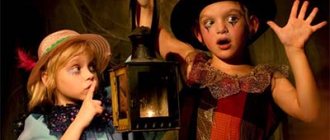The art of not arguing A wise parable for children and teenagers
In one mountain village there lived a man known for never arguing with anyone. And then a correspondent came to him to write about him in the Guinness Book of Records. And the following conversation took place between them: “Tell me, is it true that you have lived for more than 90 years and never argued with anyone?” - Yes it's true. - Well, not with anyone at all, not with anyone? - Not with anyone at all, not with anyone! - And what, even with your own wife? - Even with my wife. - Even with your children? - Even with children. - And what, in 90 years, not a single time? - Not once. - Never, never with anyone, with anyone? — the correspondent continued, already heating up. “Well, yes,” the old man answered calmly. Correspondent (blushing and irritated): - It cannot be that you have never argued with anyone in your entire life! “I argued, I argued, I argued...” the old man answered conciliatoryly.
Yuz Aleshkovsky. "Two train tickets"
Petka and Vovka Ryzhikov, who is telling this story, are going to take a train to the Moscow region and swim in the lake. Petka convinces Vovka to save on tickets and buy cream soda at the lake, a sweet, fizzy drink popular in Soviet times. Vovka hesitates, because just recently he was caught by a ticket inspector for traveling without a ticket and taken to the police nursery. And dad then said: “This is petty theft!” But the authority of Petka, who proposed a whole “rogue system,” turned out to be stronger, and the friends went to the lake without tickets.
And then a real detective story unfolds! Upon entering the carriage, the boys find two tickets (“Today’s tickets! Valid!”). But Vova’s joy quickly gives way to anxiety and remorse: by stealing other people’s tickets, they expose the people who lost them to the risk of being fined! He even commits an act of desperate courage and asks the whole carriage who lost the tickets. The owner is not there, and Vovka’s conscience calms down a little.
But circumstances develop in such a way that Petka becomes a hostage to his “rogue system”, and the guys come face to face with the controller. They have someone else's tickets, but things take an unexpected turn. The controller demands tickets from an intelligent old man in a white suit and his grandson, a thin-lipped boy. They didn’t have any tickets, but the old man said that he was a “crystalline honest person,” and his grandson probably simply dropped the tickets from his pocket. The grandson confirms this with a loud sob. Unable to bear the reproaches of his conscience, Petka gives the old man the tickets he found. But the guys will have a conversation with the controller. And then it turns out that the lost tickets do not belong to the old man with his whiny grandson, but to a guy and a girl traveling in the next carriage - they dropped them when entering the train. And the nasty crybaby only pretended that he bought tickets and “wasted the money on ice cream.” So the crystal-honest grandfather with kind blue eyes grew up with a vile, deceitful grandson.
The controller lets the boys go without fining them. And again they have a choice: ride back with hares or pay honestly. Petka acts like an experienced tempter: “Maybe we can eat the return tickets after all? We did the deed...” But Vovka shows firmness. The story clearly shows that “rogue systems” are collapsing and their “builder” will be ashamed. And that justice does not always triumph here and now: the nasty thin-lipped boy buys ice cream with the money he saved and, driving past the guys standing on the platform, makes a disgusting face at them. But the main thing, says Yuz Aleshkovsky, is your own calm conscience. Be an honest person - for yourself first of all.
3.
Laziness, Mistrust A wise parable for children and teenagers
Once upon a time, a wise man lived in the East, and one day five young, strong men came to him. They were all different, but they were connected by one single dream - to find their Happiness in this life. They asked the sage for advice on how to achieve Happiness, to which the sage gave them a map, which marked the path to the cherished Happiness. And this long, difficult path lay through beautiful places, picturesque countries, mysterious caves and lands.
The travelers set off on the road... they walked for a long time, but after going a fifth of the way, one of them said that he was tired of walking along the road and returned back, not finding happiness. After some time, when two-fifths of the entire journey was left behind, the second young man said: “The old man deceived us, there is no happiness,” and returned back. A lot of time passed before more than half the road was left behind, and then the third young man could not stand it and turned back with the words: “I believe in Happiness, but I cannot find it.”
The last two young men continued their journey. They continued to walk, strictly following the map... one of them was cheerful, talked with people he met along the road, enjoyed the singing of birds in the mysterious forests, greeted the dawn with a smile, and the second walked gloomily, not paying attention to anyone, grumbling about it When will this journey finally end? And so! The long-awaited day came, the travelers turned the last corner and now... they found themselves in front of the gates of their hometown, where the map led them. A cheerful, cheerful young man rushed into the arms of his family and friends, who had been waiting for him for so long; over time, he found a girl in his city, fell in love with her, got married and became happy. And the second, gloomy traveler, disappointedly returned to his ordinary life, having never found Happiness.
After some time, the young men met and decided to ask the sage why he deceived them by giving them a map that actually led not to Happiness, but back to home. After listening to the young men’s complaint, the wise old man replied: “In fact, I did not deceive you, the card that you received really led to happiness. But only three of you turned away from your path, some earlier, some later... one because of laziness, the other because of distrust, the third because of insufficient self-confidence. It doesn’t matter for what reason you turned away from this path, it also doesn’t matter at what point it happened, since the result was the same - you didn’t find your Happiness.”
To this, the gloomy young man, who had reached the end of the path, said: “What about me, old man? I reached my goal, but why didn’t I find Happiness?” The sage replied: “You walked without discerning the path, rejecting the beauties that surrounded you, you didn’t see people, you didn’t hear birds singing... your goal was not Happiness, but only the end of the path... that’s why you didn’t find Happiness.” And then the last young man said: “Tell me, sage, why did you send me on such a long journey? Yes, I walked through it with a smile and in the end found my Happiness, but I could have found it without going all this way.” The sage shook his head and said: “I gave you the map so that you understand that Happiness is not always as far away as we think. And the long path is not always the only true one; perhaps happiness is very close. But would you understand this if you didn’t have to go through so many roads on the way to him?”
This is how, to this day, Laziness, Mistrust, Insufficient self-confidence and Wrongly set goals prevent us from getting to our Happiness, which is actually not as far away as we think.
Dmitry Dmitriev. "Tramp"
From the collection of stories “The Magic Violin”
This conventionally fairy-tale story is nevertheless based on real facts. An adult reader who knows Russian history, especially the beginning of the twentieth century, will immediately guess who the prototypes of its heroes are.
In the capital of a certain kingdom there is a beautiful park where citizens with children like to walk. But the children of the rich and their nannies jealously guard the boundaries of their playground, not letting the poor people in. Social stratification, very reminiscent of the post-Soviet situation. But then a newcomer appears on the site - a boy with patches on a modest frock coat, with an old teddy bear. He is accompanied by an old man in a soldier's overcoat, to whom the boy addresses “Your Excellency.” The nannies, outraged by the invasion of the territory of privileged children by some ragged impostors, begin to make fun of them. And after the nannies, their wards join in the persecution: the children of a banker, a general, the owner of a large store. Offensive teasers fly like arrows at the simple-minded, friendly boy with patches: “Tramp, tramp, dance for a nickel!” Out of resentment, he cannot hold back his tears, but the wise old man who came with him remarks: “What are you doing, soldier, what are you doing? You yourself wanted to come here. Maybe it's for the better. Let’s go to the tramps, it’s business.” The children of ordinary workers turn out to be much friendlier and kinder, and the boy is willingly accepted into the games.
And when the royal carriage appears in the park, everyone is amazed to discover that the boy in a shabby frock coat is the heir to the throne himself, who wanted to “go among the people.” The next day, the children of the poor receive sweets and toys - just like in a real fairy tale, kindness is rewarded. And the arrogant and evil rich people are left with nothing.
The story clearly shows a parallel with the family of the last Russian Emperor Nicholas II. Tsarevich Alexei and his sisters, as you know, were raised by their parents in severity, in respect for people regardless of class, developing in them hard work, sensitivity, and modesty. This is exactly how the young heir to the throne is portrayed - open, friendly, modest - in the story by Dmitry Dmitriev.
5.
The world is a big mirror A wise parable for children
One day a student asked his teacher: “Teacher, does the world around us bring good or bad luck to a person?” “Let me tell you a story,” he said. A long time ago there lived a Shah, and he decided to build a castle full of wonders. And he made a hall in this castle, in which all the walls, floor and ceiling were covered with mirrors. And the walls there were arranged in such a way that if someone said out loud, “Who’s here?”, they would immediately hear “Who’s here?” “Who’s here?” “Who’s here?” One day a dog ran into the hall and froze in amazement in the middle - a whole pack of dogs surrounded it on all sides, above and below. The dog, just in case, bared its teeth; and all the reflections answered her in the same way. Seriously frightened, the dog barked desperately. The echo repeated her bark. The dog barked louder. Echo did not lag behind. The dog rushed back and forth, biting the air, its reflections also rushed around, clicking its teeth. The next morning, the servants found the unfortunate dog lifeless, surrounded by millions of reflections of dead dogs. There was no one in the hall who could cause her any harm. The dog died fighting his own reflections.” “Now you see,” finished the dervish, “the world brings neither good nor evil in itself.” He is indifferent to people. Everything that happens around us is just a reflection of our own thoughts, feelings, desires, and actions. The world is a big mirror...
Vitaly Korzhikov. "One long, two short"
From the collection “Sea Chest”
Vitaly Korzhikov recalls how, during a circumnavigation around the world, heading for India, his ship fell into thick fog near China. To prevent ships from running into the rocks, a beacon was installed in that place, which gave signals: one long flash, two short ones. But the lighthouse broke down, and the crew became seriously alarmed - the place was dangerous. And then suddenly they noticed a boat not far from their ship, and in it a little boy with a lantern in his hands.
The unknown boy commands the respect of adults, experienced sailors. He bravely carries out his watch in a small boat in a stormy stormy sea infested with sharks. Because the lives of many people passing by on ships now depend on the signals of his lantern.
The story, among other things, teaches to treat people of any nationality with respect. Human worth is not determined by the color of one's skin. And it is determined by courage, the ability to sacrifice one’s well-being for the sake of other people, even strangers.
4.
Love, wealth and luck Wise parable for children
A woman came out of her house and saw three old men with long white beards in the street courtyard. She didn't recognize them. She said, “You probably don’t know me, but you must be hungry. Please come inside and eat." “Is your husband at home?” they asked. “No,” she replied. "He's not there." “Then we cannot enter,” they replied. In the evening, when her husband returned home, she told him what had happened. “Go and tell them that I’m home and invite them to the house!” said the husband. The woman came out and invited the old men. “We cannot go into the house together,” they replied. “Why?” she was surprised. One of the old men explained: “His name is Wealth,” he said pointing to one of his friends, and said pointing to another, “And his name is Luck, and my name is Love.” Then he added, “Now go home and talk to your husband about which of us you want in your home.” The woman went and told her husband what she had heard. Her husband was very happy. “How good!!!”, he said. “If we have to make a choice, let’s invite Wealth. Let him come in and fill our house with wealth!” His wife objected, “Darling, why don’t we invite Luck?” Their adopted daughter listened to everything sitting in the corner. She ran up to them with her proposal: “Why don’t we invite Love? After all, then love will reign in our house!” “Let’s agree with our girl,” the husband said to his wife. “Go and ask Love to be our guest.” The woman came out and asked the three old men, “Which one of you is Love?” Come into the house and be our guest." An old man named Lyubov walked in the direction of the house. The other 2 old men followed him. Surprised, the lady asked Wealth and Luck: “I only invited Love, why are you coming?” The old men replied: “If you had invited Wealth or Luck, the other two of us would have remained on the street, but since you invited Love, where she goes, we always follow her. Where there is Love, there is always Wealth and Luck!”
Sergey Makhotin. "Sixth-grader Seraphim"
In the story of the modern Russian writer Sergei Makhotin, ninth-grader Tanya, reciting Pushkin’s poem “The Prophet” in class, made a mistake: instead of “six-winged seraphim,” she said “sixth-grader Seraphim.”
The trouble is that there really was a sixth-grader named Seraphim at school. And now a new nickname is already assigned to the boy, which greatly offends him. Seraphim feels lonely, he stops smiling and starts getting bad marks. Then Tanya, through whose fault the boy’s nickname appeared, advises him to read Pushkin’s work. The poem makes a great impression on Seraphim. It helps him to fall in love with his previously hated name and return to normal life.
At the end of the story, Seraphim enters seventh grade. They stop teasing him, because the nickname “seventh-grader Seraphim” no longer seems funny.
3.
About the wind and the flower A wise parable for children and teenagers
The Wind met a beautiful Flower and fell in love with it. While he gently caressed the Flower, it responded to him with even greater love, expressed in color and aroma. But this seemed not enough to the Wind, and he decided: “If I give the Flower all my power and strength, then he will give me something even greater.” And he breathed on the Flower the powerful breath of his love. But the Flower could not bear the stormy passion and broke down. The wind tried to lift him and revive him, but could not. Then he calmed down and breathed the gentle breath of love on the Flower, but it withered before our eyes. Then the Wind shouted: “I gave you all the power of my love, and you broke!” Apparently, you didn’t have the power of love for me, which means you didn’t love! But the Flower did not answer. He died.
Anyone who loves must remember that Love is not measured by force and passion, but by tenderness and reverent attitude. It's better to hold back ten times than to break once.
Olga Kolpakova. "Reverse Duel"
Collection “School Reader. Funny stories about modern schoolchildren", publishing house "Makhaon"
Igor, Kolya and Katya constantly quarrel with each other. A fight starts over some nonsense, but the consequences are serious. One day Igor “Koley” broke the glass in the closet. After which the teacher Irina Alekseevna declared a duel, because their gymnasium is “with a Pushkin bias”, and the children know well how duels end.
The plot is unusual and intriguing. The reading is addictive: how is it that the teacher, instead of stopping quarrels, organizes a duel between the students? And how, I wonder, will this duel go? Opponents will shoot with words, Irina Alekseevna decided. But not “calling names and yelling at each other,” which the heroes of the story are perfectly able to do. The teacher turned out to be resourceful and came up with a great way to calm down and reconcile the children (a life trick that will be useful for teachers and parents).
“Your cartridges will be unusual. You must shoot with good words about your opponent. They're called compliments. Whoever fails to find the right words first loses and will have to learn two more Pushkin poems.”
It’s very funny to watch how yesterday’s enemies painfully remember something good about each other and, first through force, and then more and more confidently, say nice things to each other. And Igor even apologizes to Kolya for the torn notebook, and he generously forgives him.
The story is not only witty, but also instructive. Just like in Bulat Okudzhava’s song: “Let’s compliment each other, because these are all happy moments of love.” Friendly love, not enmity, that's what's important.
6.
A parable for teenagers. Full jar
A philosophy professor, standing in front of his audience, took a five-liter glass jar and filled it with stones, each at least three centimeters in diameter.
At the end he asked the students if the jar was full?
They answered: yes, it’s full.
Then he opened a can of peas and poured its contents into a large jar, shaking it a little. The peas took up the free space between the stones. Once again the professor asked the students if the jar was full?
They answered: yes, it’s full.
Then he took a box filled with sand and poured it into a jar. Naturally, the sand completely occupied the existing free space and covered everything.
Once again the professor asked the students if the jar was full? They answered: yes, and this time definitely, it is full.
Then from under the table he took out a mug of water and poured it into the jar to the last drop, soaking the sand.
The students laughed.
“And now I want you to understand that the jar is your life.” Stones are the most important things in your life: family, health, friends, your children - everything that is necessary for your life to still remain complete even if everything else is lost. Polka dots represent things that have become important to you personally: work, home, car. Sand is everything else, little things.
If you fill the jar with sand first, there will be no room left for the peas and rocks to fit. And also in your life, if you spend all your time and energy on small things, there is no room left for the most important things. Do what makes you happy: play with your children, spend time with your spouse, meet with friends. There will always be more time to work, clean the house, fix and wash the car. Deal first of all with stones, that is, the most important things in life; define your priorities: the rest is just sand.
Then the student raised her hand and asked the professor, what is the significance of water?
The professor smiled.
- I'm glad you asked me about this. I did this simply to prove to you that no matter how busy your life is, there is always a little room for idleness.
Lev Tolstoy. "Bounce"
Many people associate the work of Lev Nikolayevich Tolstoy with huge novels that are difficult to read even for an adult. However, the writer has many small but fascinating works that appeal to young readers.
The story "The Jump" takes place on a ship. One day on deck a large monkey was performing funny tricks. To the amusement of the public, she grabbed the hat of the boy, the captain's son, and climbed onto the mast with it. The audience, naturally, laughed, and the boy followed the monkey. Having reached the very top, he found himself in a dangerous position. The people below were scared and did not know what to do. Then the captain noticed what was happening. He immediately ordered his son to jump into the water and even threatened to shoot. As a result, the boy jumped into the water, the sailors lifted him on board and pumped him out.
This short story shows that sometimes a person is ready to risk his life just not to seem funny. But you shouldn’t pay attention to stupid jokes and get offended by them.
4.
Parable of Anger
“The father told his hot-tempered son to drive a nail into a tree in a moment of anger. Every day the number of nails hammered decreased. And then the day came when he never lost his composure. When the father found out about this, he told his son that the day he managed to control himself, he could pull one nail out of the tree. Finally the day came when not a single nail was left in the tree. The father said: “You have worked hard on yourself, but you see that this tree will never be the same as before. When you say something evil to a person, he also gets a scar. It hurts even more for a person than for a tree.”
Yuri Yakovlev. "Captain Gastello's Friend"
Modern children for the most part do not know who Captain Gastello is. And this is a pilot who carried out a fiery ram with his crew in the first days of the war and blew up a column of enemy equipment. The whole country knew his name, he was a favorite hero of boys who dreamed of becoming pilots. So the hero of this story, Seryozha, “admired him and experienced his death, as if the unfamiliar captain, who gave his life long before Seryozha was born, was his loved one.”
And then suddenly a friend of Seryozha’s father, Uncle Vladya, boasting of his front-line exploits, speaks disparagingly about the famous pilot.
Seryozha tries to stand up for Captain Gastello, but the adults don’t even let him open his mouth. Then Seryozha goes in search of Nikolai Gastello’s fighting friends, who could repel the arrogant, meaty Uncle Vlad. In the flight unit, where Seryozha rushes, he meets a front-line pilot and he goes with the boy to explain to Uncle Vlad whether Gastello was a hero.
The ending of the story is unexpected. It turns out that Colonel Rostov never met Captain Gastello. But to Serezha’s disappointed question: “So you’re not his friend?” - the pilot firmly answers: “No, I’m his friend. Just like you. After all, people have many more friends than they think. And friends will never give offense to the name of those who gave their lives for their Motherland.”
2.
Sun and wind
Presentation with a parable. The best legend, parable, history. Speaking with a parable
The Sun and the Wind argued which of them is stronger?
And the Wind said: “I will prove that I am stronger. Do you see the old man in the raincoat? I bet I can get him to take off his coat faster than you can.”
The sun hid behind a cloud, and the wind began to blow stronger and stronger until it almost turned into a hurricane. But the harder he blew, the tighter the old man wrapped himself in his cloak.
Finally the wind died down and stopped. And the Sun peeked out from behind the clouds and smiled tenderly at the traveler. The traveler cheered up and took off his cloak.
And the Sun told the Wind that kindness and friendliness are always stronger than rage and strength.
Anton Chekhov. "Over salted"
Anton Pavlovich Chekhov is rightfully considered a master of the short story. Among his works you can find those that will be of interest not only to adults, but also to children of early adolescence. The story “Over-Salted” is one of them.
The plot of the work is light and humorous. Land surveyor Gleb Gavrilovich Smirnov is looking for horses to get to the estate where he was invited to work. He finds the “biggest guy” Klim, who agrees to take him to the village. They drive for a long time until it gets dark. The quiet forest and darkness evoke fear in the cowardly land surveyor. Finding himself in the middle of the forest alone with the driver, he begins to think that he is a robber. To protect himself from attack, Gleb Gavrilovich lies that he took revolvers with him and generally poses as a strongman and a bully. This scares the cab driver so much that he runs into the forest. Then the land surveyor realizes that he has “over-salted” his boasting. The hero has to call Klim back. After much persuasion, he finally returns, and the companions continue on their way.
Given the tendency of many teenagers to show off (the reason for which is self-doubt), the story may be useful to the young reader.
2.
Fight with Leo
The lion was resting in the shade of a large tree after a hearty lunch. It was midday. Heat. The Jackal approached the Lion. He looked at the resting Leo and timidly said:
- A lion! Let's fight!
But the answer was only silence.
The jackal began to speak louder:
- A lion! Let's fight! Let's have a battle in this clearing. You are against me!
Leo didn't pay any attention to him.
Then the Jackal threatened:
- Let's fight! Otherwise I’ll go and tell everyone that you, Leo, scared me terribly.
Leo yawned, stretched lazily and said:
- And who will believe you? Just think! Even if someone condemns me for cowardice, it is still much more pleasant than the fact that they will despise me. Despised for fighting with some Jackal...
Mikhail Prishvin. "Mystery Box"
Resourcefulness is a person's main weapon. This is the subject of a short story by Mikhail Prishvin. The action takes place in Siberia, where there are many wolves. The narrator meets an old hunter who claims that a wolf cannot compete with a man, because he, even unarmed, is capable of using his ingenuity to find protection from a ferocious predator.
To prove his point, he tells the story of a hunter who “turned a simple box into a weapon.” Left alone with the wolf pack, the hero hid in a box and slowly began to move towards the side of the road. The leader of the pack tried to approach such a cunning shelter, but the man blew and screamed, which frightened the wolves. The predators fled, after which the hunters found their lost comrade.
Images and illustrations https://ru.depositphotos.com
Quickly conclusions
One old woman told a man that his neighbor was dishonest and that he might even steal an axe.
The man came home. And - immediately look for an ax.
No axe!
I searched the whole barn - there is no ax anywhere!
Goes out into the street. He sees the neighbor coming. But he doesn’t just walk: he walks like someone who has stolen an axe, and he looks with squinted eyes like someone who has stolen an axe, and he smiles like someone who has stolen an axe. The neighbor even said hello, like a man who had stolen an axe.
“What a dishonest neighbor I have!” - the man decided.
He harbored a grudge and returned home. Lo and behold, there’s an ax lying under the barn. His axe! Apparently one of the children took the ax but didn’t put it back. The man was happy. Satisfied, he leaves the gate. And he sees that the neighbor is not walking like someone who has stolen an axe, and he is looking with narrowed eyes, not like someone who has stolen an axe, and he is not smiling like someone who has stolen an axe.
“What an honest neighbor I have!”
O.Henry. "Gifts of the Magi"
This short, well-known Christmas story with O. Henry's signature unexpected ending is perfect for children aged 12 years.
Young couple Jim and Della Young live in a poor area of New York. They barely make ends meet. The couple has only two treasures - Della's luxurious curls and Jim's gold watch. On the eve of Christmas, the heroes discover that their money is not enough to give each other holiday gifts. Then Della decides to sell her main wealth - her brown hair - in order to buy her husband an expensive watch strap. When the time comes to give gifts, it turns out that Jim also parted with the object of his pride and bought his beloved luxurious hair combs.
The story is amazing in its beauty. This is a lesson in selfless and sincere love.
6.
Two apples
A parable about not making hasty conclusions.
A little girl brought two apples from the street. Probably someone gave it to me.
- Mom, look how beautiful the apples are! - Yes, beautiful! Will you treat me? - Mom asked.
The little girl looked at the apples. And then she took a bite from one apple. I thought for a second and... - I bit the second one.
Mom was surprised. And I thought:
- What a greedy girl I’m growing up. She started eating both apples, but didn’t offer me one.
But to her surprise, the girl handed her mother one apple with the words:
- Mommy! Take this apple! It's sweeter!







